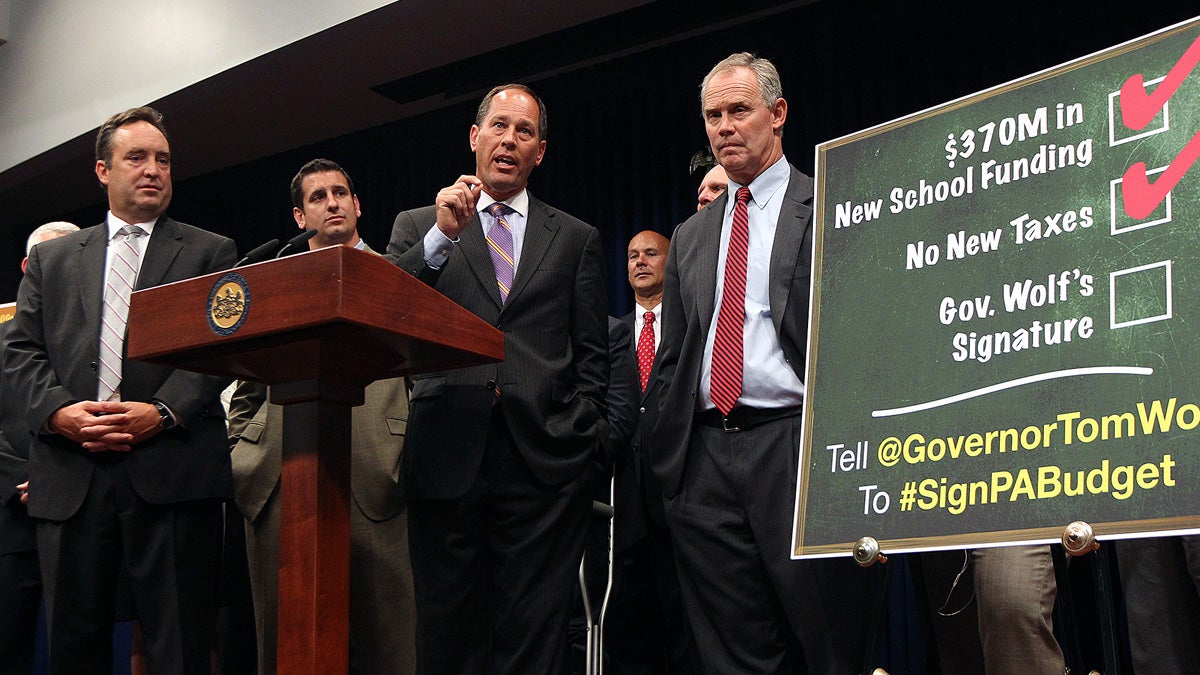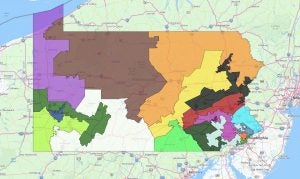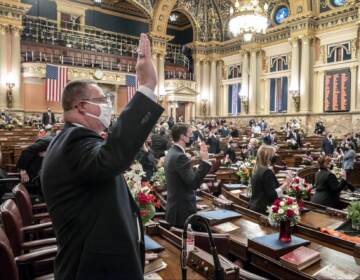Day three of Pa. gerrymandering trial brings insights to legislative process, but secrecy remains
On day three of the federal trial, key Republican staffers testified that partisan data was used during the 2011 redistricting process.

Senate President Pro Tempore Joseph Scarnati, R-Jefferson (middle), and Speaker of the House Mike Turzai, R-Allegheny (right), at a press conference in 2017. (AP Photo/Chris Knight)
UPDATE: 12/7/17 1:00pm
On day three of the federal trial contesting Pennsylvania’s congressional map, key Republican staffers testified that partisan data was used during the 2011 redistricting process.
Behind the scenes, a dispute over the depositions of House Speaker Michael Turzai (R-Allegheny) and Senate President Pro Tempore Joe Scarnati (R-Jefferson) has bubbled up in court documents.
In the case, a group of Pennsylvania voters claim they have been harmed by partisan gerrymandering and are calling for a new map in time for the 2018 congressional midterm elections.
At the time of the last redistricting in 2011, Scarnati held his current leadership role and Turzai was majority leader in the House.
In the lead-up to the trial, there was fierce debate over whether and to what extent the two leaders would participate. Both hoped to avoid the proceedings altogether by claiming “legislative privilege.”
The court denied that claim, compelling both to be deposed.
But during their depositions, both leaders declined to answer several questions about the redistricting process, again claiming “legislative privilege” despite the court order.
Attorneys representing Turzai stated they interpreted the court order to allow legislative privilege when it came to communications with members and staff of the legislature.
Pending a court decision, these depositions remain inaccessible to the public.
In the meantime, plaintiffs’ attorneys filed a request for sanctions against Turzai and Scarnati for failing to comply with court orders.
“Defendants’ actions show a bad faith disregard for the Orders of this Court, and a sanction is called for,” plaintiffs’ attorneys wrote in the sanction request. “Defendants are trying to hide evidence of their intent to gerrymander in enacting the 2011 redistricting plan, and they are ignoring Court Orders to allow discovery on the issue.”
That request has produced a court document that at least sheds light on what Turzai wouldn’t say during his Nov. 28 deposition.
Here are the questions Turzai declined to answer:
- Who gave direction to the staff on what map should look like?
- Did Congressman Bob Brady support the bill?
- How did anyone communicate to you that a group of Democrats supported the bill?
- Are the state rules as to setting district lines good rules that are important to follow?
- What did you do to get the Democrats on board for bipartisan support?
- What are the names of staff members who worked on the map?
- Was any partisan intent at the play in the creation of the 17th district?
- Were some legislators upset that the Lehigh Valley was being divided between two congressmen?
- Was the 17th district intended to concentrate Democratic votes?
- Do you know why some Democratic members voted for the map?
- Did Bill Schaller (“the head of our redistricting”) meet with members of Congress or their staff?
The three-judge panel has not ruled on the call for sanctions against the lawmakers, and the matter has not been discussed in open court since the motion was raised.
Attorneys for Turzai and Scarnati say sanctions are “extreme” and “completely unwarranted,” criticizing the defense for failing to object during the deposition and waiting until “the eleventh hour the night before the trial” before raising the issue.
Keystone Crossroads reached out to Speaker Turzai’s office in an attempt to clarify his rationale for not answering these questions, but did not hear back before original publication of this story.
In an email response, a spokesperson for the Speaker later stated: “Turzai did answer the questions — most, if not all — posed by counsel.”
Partisan data
In Wednesday’s court proceedings, judges heard testimony from two high-level Republican staffers.
Neither William Schaller, director of Republican district operations, nor Erik Arneson, top aide to then-Senate Majority Leader Dominic Pileggi, were present in the courtroom.
Instead, in a scene reminiscent of a drama rehearsal, attorneys for the plaintiffs and defendants, took turns acting out the staffers’ testimony before the gallery.
At one point, defense attorney Brian Paszamant asked the judges if he should play the part of himself in the reading. Chief Judge D. Brooks Smith responded that he “fit the part,” which drew a few chuckles from all sides.
Schaller, director of reapportionment services for the House Republicans at the time, testified that he was tasked by leadership with developing the western half of the 2011 congressional district map. He said the Senate developed the eastern half of the state.
“They had their part and we had our part,” Schaller testified.
In his deposition, Schaller affirmed that partisan data — voter party registration information and election results broken down by the county, municipal, voting precinct and census block level — was one of many factors considered in creating the map.
Others included: population, past districts, U.S. Census data by race, incumbents’ residencies, and the Voting Rights Act, which holds that redistricting shouldn’t disenfranchise minority voters.
Schaller said he began working on the map over the summer of 2011 and produced multiple drafts. After consulting with caucus members, he made revisions and those conversations drove the final version of the map.
Erik Arneson, former communications and policy director for Pileggi, testified that his role mostly pertained to redrawing the state senate’s map, participating only minimally in congressional redistricting.
But he also confirmed that partisan data was considered and said leaders “intended to respect incumbency” in the new map.
He testified to meeting with Republican Congressman Bill Shuster (PA-9) about redistricting and to receiving input from Democratic Congressman Bob Brady (PA-1). Schaller recalled meeting with U.S. Rep Glenn “GT” Thompson (PA-5) about the map.
Both Schaller and Arneson characterized their roles in redistricting as a part of the overall legislative processes in Harrisburg.
“We got a bill enacted to law. As far as I’m concerned, that was a success,” said Arneson, who now heads the state’s Office of Open Records.
Appearing in person, attorneys representing the voters called State Sen. Andrew Dinniman (D-Chester) — a member of the State Government Committee — as a witness to testify about the process in which the congressional district map was enacted.
Senate Bill 1249 was first introduced by Pileggi, Scarnati, and State Sen. Charles McIlhinney (R-Bucks) on Sept. 14, 2011. Dinniman said it was nothing more than a “shell” lacking any detail or descriptions of the districts. In that version of the bill, each congressional district name is listed with the nondescript placeholder: “is composed of a portion of this Commonwealth.”
Dinniman testified that he did not receive any details about the makeup of the congressional districts until the bill was amended on Dec. 14, 2011, the same day it was passed.
“I felt the partisan matter was an inappropriate — whether by Republicans or Democrats — way to do business,” he said.
In the three months between the time the bill was introduced and passed, Dinniman said he remembered inquiring about it with McIlhinney, the majority chairman of the State Government Committee at the time.
According to Dinniman, McIlhinny told him Republican congressmen in the 6th, 7th, and 16th districts, “were each at each other trying to get the maximum number of Republican votes in their district.”
Defense attorneys protested this part of Dinniman’s testimony since the court did not hear directly from McIlhinny.
During cross examination, defense attorney Brian Paszamant pointed out that Dinniman voted for the “shell” bill.
He did not, though, vote for the final version of the bill in a sharply divided contest to move it out of committee. Republicans Mike Folmer (Lebanon) and Michael Brubaker (Lancaster) crossed party leadership to vote against the bill. Philadelphia Democrat Christine Tartaglione, who lives in Brady’s congressional district, voted for it.
It squeaked out of committee by a 6-5 tally with the help of Scarnati’s ex-officio vote.
Also, testifying in court on Wednesday were two more plaintiffs, John Gallagher, a Democrat and Ani Diakatos, a Republican, both who reside in the 1st congressional district in Delaware County.
The defense called expert witness, James Gimpel, a professor at the University of Maryland, who studies elections and political behavior. He disagreed with the conclusions of the plaintiffs’ first expert witness, Daniel McGlone, and did not see an intentional partisan gerrymander in the 2011 congressional district map.
Several national studies have concluded the opposite, ranking Pennsylvania as one of the most gerrymandered states in the county.
Currently, despite a 25 percent edge for Democrats in statewide voter registration totals, Pennsylvania’s congressional delegation includes 13 Republicans and five Democrats.
Closing arguments are expected on Thursday.
WHYY is your source for fact-based, in-depth journalism and information. As a nonprofit organization, we rely on financial support from readers like you. Please give today.







